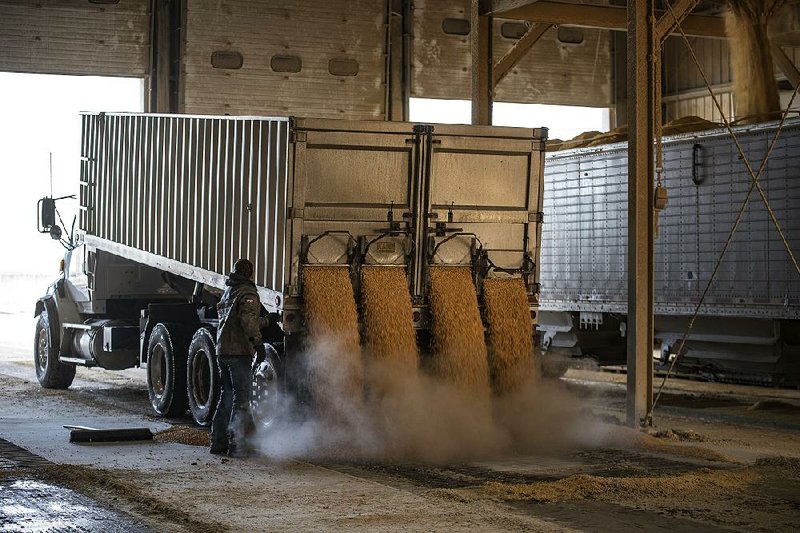President Donald Trump moved on Tuesday to make it easier to sell more ethanol in vehicle fuel, delivering a victory to corn farmers and biofuel producers that stands to translate to long-term market gains.
Trump directed the Environmental Protection Agency to lift summertime fueling restrictions on gasoline containing up to 15 percent ethanol, according to Republican lawmakers. Trump traveled to Iowa on Tuesday to promote the change at a political rally. Iowa is the nation's top producer of both that biofuel and the corn used to make it.
The EPA currently bans the high-ethanol blend, called E15, during the summer because of concerns that it contributes to smog on hot days, a claim ethanol industry advocates say is unfounded.
The senior administration official said the proposed rule intends to allow E15 sales next summer. Current regulations prevent retailers in much of the country from offering E15 from June 1 to Sept. 15.
"It's an amazing substance. You look at the Indy cars. They run 100 percent on ethanol," Trump said at the White House before he left for Iowa.
He said he wants more industry and more energy and he wants to help farmers and refiners.
The shift is seen as helping bolster Midwest Republicans in tough election contests and appeasing corn farmers battered by agricultural tariffs.
Trump's action may deliver a psychological boost to rural voters leading up to the November elections, but it won't yield immediate dividends for E15.
The EPA will now spend months using a formal rule-making process to finalize the shift on E15, which contains 15 percent ethanol and 85 percent gasoline. Even then, there may be years of additional uncertainty, as opponents vow to sue, arguing that the EPA doesn't have legal authority to waive E15 from air-pollution requirements without further action from Congress.
The administration's plan is "a backdoor 'fix' to artificially boost sales and justify future government-imposed increases to the ethanol mandate," said Nan Swift, director of federal affairs at the National Taxpayers Union. "Consumers have repeatedly made it clear that they do not want more ethanol in their fuel. We need a truly free market, not more government manipulation."
Most gasoline contains 10 percent ethanol, which is permitted year-round. Only about 1 percent of filling stations sell E15 -- a figure that could climb significantly with Trump's change, since some retailers have been discouraged by the need to change pumps and labels seasonally.
Trump had to do "damage control" with his agricultural, Republican base as they bear the brunt of the U.S. trade war with China, said Mack Shelley, chairman of the political science department at Iowa State University. The move is "designed to shore up support for Republican voters," Shelley said.
The action also provides Iowa Gov. Kim Reynolds and Republican U.S. Rep. David Young with evidence they helped get the policy change across the finish line. Both are locked in tight election contests, and both have pressed Trump to authorize year-round E15 sales.
Analysts expect relatively modest gains in the short term but there's greater potential down the road.
"In theory, the new rule would allow ethanol's share of the gasoline pool to increase as much as 5 percentage points as E15 supplants E10, but in fact any such change is far off and rests on dubious legal grounds," James Lucier of Capital Alpha Partners said in a research note.
Ethanol's gain comes at the expense of the oil industry, which has lobbied against the move.
American Petroleum Institute President Mike Sommers said the E15 shift "is not in the best interest of consumers" because using it risks engine damage in older cars on the road today.
"EPA has previously stated that it does not have the legal authority to grant the E15 waiver, and we agree with that assessment," Sommers said in an emailed statement. "The industry plans to aggressively pursue all available legal remedies against this waiver."
Because ethanol is corrosive, critics say E15 can cause damage to cars, especially older ones. For years, some car manufacturers explicitly warned that car warranties would be voided if motorists use the fuel, but major automakers have backed off from that opposition.
Ford Motor Co., which was one of several manufacturers to warn in 2011 of potential damage to engines and fuel-supply systems, is no longer against E15 and has built its vehicles to be capable of running on the fuel since the 2013 model year, said John Cangany, a company spokesman.
Trump is paring his ethanol announcement with a call for the EPA to impose new restrictions on the trading of Renewable Identification Numbers, the credits refiners use to prove they have satisfied biofuel blending quotas.
Information for this article was contributed by Jennifer A. Dlouhy, Mario Parker, Ryan Beene, Keith Naughton, Craig Trudell, Jennifer Jacobs and Toluse Olorunnipa of Bloomberg News; and by Matthew Daly of The Associated Press.
Business on 10/10/2018
